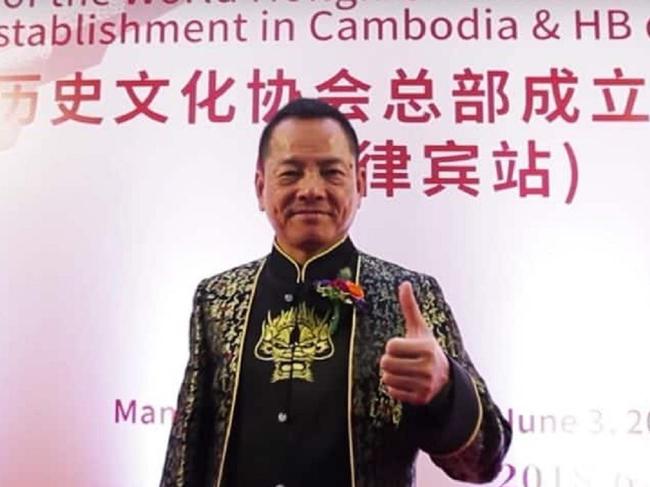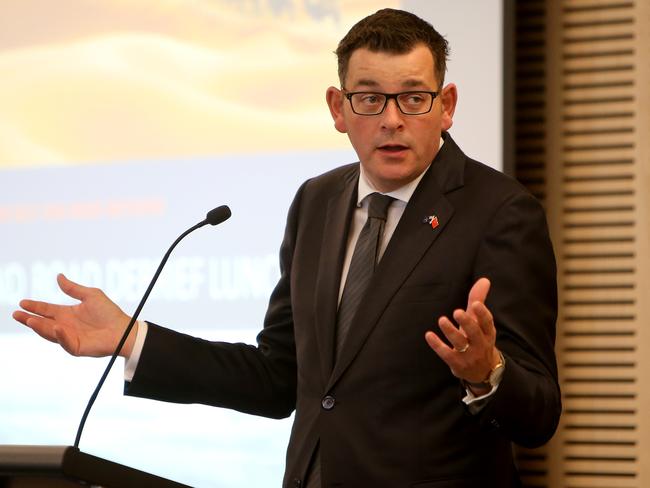Former triad boss Wan Kuok-Koi’s role in Belt and Road scheme
A notorious former Chinese triad boss has emerged as one of the key backers of the Belt and Road trade route, which is also being used by criminals.
Crime in Focus
Don't miss out on the headlines from Crime in Focus. Followed categories will be added to My News.
Two years ago Wan Kuok-Koi, a leading figure in the Communist Party of China, travelled to Cambodia to open a branch of the world Hongmen History and Culture Association.
As part of its establishment Wan made a four-minute video clip to promote the Hongmen, a secretive fraternity that was started in the mid-1600s, as a patriotic union that would spread across South East Asia to promote the interest of China, notably in nations along the Belt and Road trade route from Asia to Europe.
“I will do my utmost to promote the national policy and assist in whatever way for peaceful and united cross-straits relations,” the 62-year-old declared.

He went on to detail how the organisation would help youths and the elderly and provide security to Chinese businessmen hoping to work along the ‘China Dream’ trade initiative.
He quickly followed the Cambodia branch with another in Palau and later other entities under the Dongmei Group in Hong Kong and Myanmar where the group is a key investor creating “economic zones” converting 157km of land into high rise units, hotels and casinos.
But back at the Australian Criminal Intelligence Commission, the proclamation was met with bemusement as law enforcers knew Wan better by his nickname “Broken Tooth Koi”, a former leader of the notorious 14K Triad that was entrenched in drug importations into Australia and key Asian-Australian crime figures, controlling a large proportion of trafficking imports including cocaine and MDMA into the country for the past decade.
The Australian authorities had already been warned by US counterparts that many Chinese enterprises in BRI projects had some things in common, including creating powerful business networks developing legitimate enterprises with corrupt cores.

Critically the commonality was “their leadership has links to criminal networks or actors involved in illicit activities in other parts of Southeast Asia, as well as China; they have pre-existing organisations engaged in casinos and crypto currencies”.
Then intelligence on at least three Australian men suspected of criminality came up as financial backers of Belt and Road, specifically in Oman and Zimbabwe raising fears it stemmed from the laundering of dollars made from Australian drug trade.
Australian and Singapore money has also specifically been tracked to a Chinese underworld casino and duty free development in Myanmar too, in the Karen State, purportedly as part BRI.
Wan himself had just spent a decade in jail for money laundering, illegal gambling and weapons charges in Macau, where he was heavily involved in the casino industry.
He also has US economic sanctions against him and last month was being assessed by Interpol at the behest of Malaysia for alleged fraud.
Australia’s war on drugs is not just law enforcement.
Australia diplomats this month entered the transnational crime fight under a $30 million initiative to help Mekong region government stop illicit drugs trade before it hits our shores.
The Mekong-Australia Program: Transnational Crime is an eight-year investment to combat drugs and firearms trafficking, money laundering and sex slavery and child exploitation in a co-ordinated effort between Cambodia, Laos, Myanmar, Thailand and Vietnam, supporting their efforts to tackle serious threats such as drug trafficking, child sexual exploitation and financial crimes.
The genesis was borne out of the 2018 ASEAN summit in which policy development and process expertise was seen as another way of helping in the fight as opposed to frontline law enforcement efforts.

DFAT officers will look to build on law enforcement capability through co-ordinated intelligence sharing and design programs and policies.
Illegal flows of illicit goods in Southeast Asia was estimated to be more than $140 billion a year.
The program’s management is out of Australia’s embassy in Bangkok.
There is a sense of urgency for the strategic analysis and program, which has already been delayed due to COVID-19.
“Poverty associated with COVID-19 related economic downturn presents fertile ground for illicit, criminal and terrorist networks, including those who engage in transnational crime (TNC) for economic gain,” DFAT analysis has warned.
“Globally, it is expected that drug production and trafficking will expand, drug markets will stabilise and prosper, and money laundering efforts will increase during the recovery period.”
The program is also part of a push to deepen engagement with South East Asia where China’s influence is seen as having an active and increasing role.
More Coverage
Originally published as Former triad boss Wan Kuok-Koi’s role in Belt and Road scheme




